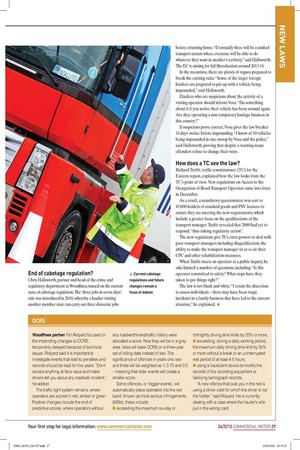OCRS
Page 19

If you've noticed an error in this article please click here to report it so we can fix it.
Woodfines partner Tim Ridyard focused on the impending changes to OCRS, temporarily delayed because of technical issues. Ridyard said it is important to investigate events that lead to penalties and records should be kept for five years. “Don’t accept anything at face value and make drivers tell you about any roadside incident,” he added.
The traffic light system remains, where operators are scored in red, amber or green. Positive changes include the end of predictive scores, where operators without any roadworthiness/traffic history were allocated a score. Now they will be in a grey area. Vosa will base OCRS on a three-year set of rolling data instead of two. The significance of offences in years one, two and three will be weighted as 1, 0.75 and 0.5 – meaning that older events will create a smaller score.
Some offences, or ‘trigger events’, will automatically place operators into the red band. Known as most serious infringements (MSIs), these include: • exceeding the maximum six-day or fortnightly driving time limits by 25% or more; • exceeding, during a daily working period, the maximum daily driving time limit by 50% or more without a break or an uninterrupted rest period of at least 4.5 hours; • using a fraudulent device to modify the records of the recording equipment or falsifying tachograph records.
“A new offence that puts you in the red is using a driver card for which the driver is not the holder,” said Ridyard. He is currently dealing with a case where the haulier’s wife put in the wrong card.










































